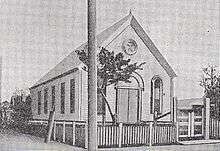Sapporo Independent Christian Church
| Sapporo Independent Christian Church | |
|---|---|
 Sapporo Independent Christian Church in July 1885. | |
 Sapporo Independent Christian Church Location of the church in Japan. | |
| 43°3′23.8″N 141°19′25.7″E / 43.056611°N 141.323806°ECoordinates: 43°3′23.8″N 141°19′25.7″E / 43.056611°N 141.323806°E | |
| Location | Sapporo |
| Country | Japan |
| Denomination | Independent |
| Website |
www12 |
| History | |
| Founded | October 2, 1881 |
| Founder(s) | Uchimura Kanzō |
| Associated people | Nitobe Inazō |
The Sapporo Independent Christian Church (Japanese: 札幌独立キリスト教会 Hepburn: Sapporo Dokuritsu Kirisuto Kyōkai, or Sapporo Christian Church) is a church located in Sapporo, Japan. It was founded in 1881 by students of William S. Clark at the Sapporo Agricultural College.[1][2] These students became known as the "Sapporo band" of Christians.[3] Although Clark had returned to the United States by the time the church was founded, he supported it financially and corresponded with its members through letters.[2] Members of the church include Uchimura Kanzō, who went on to found the non-church movement, and Nitobe Inazō, who became president of the Tokyo Women's Christian College, an under-secretary at the League of Nations, and was the author of Bushido: The Soul of Japan.[1]
References
- 1 2 Duke, Benjamin C. (2009). The History of Modern Japanese Education: Constructing the National School System, 1872-1890. Piscataway, New Jersey: Rutgers University Press. p. 217. ISBN 978-0-8135-4648-3.
- 1 2 Beauchamp, Edward R.; Iriye, Akira (1990). Foreign employees in nineteenth-century Japan. Boulder: Westview. p. 82. ISBN 978-0-8133-7555-7.
- ↑ Oshiro, George M. (2007). "Nitobe Inazō and the Sapporo Band: Reflections on the Dawn of Protestant Christianity in Early Meiji Japan" (PDF). Japanese Journal of Religious Studies. 34 (1): 99–126.
External links
- Official site (Japanese)